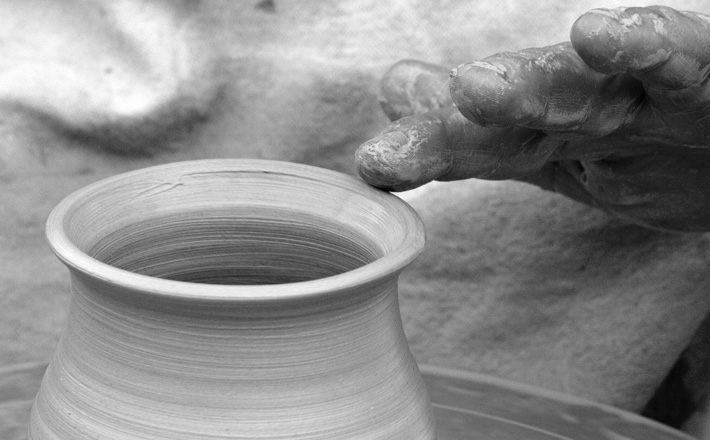Commentary on Luke 14:25-33
Last week’s pericope from Luke was set inside, namely, in the home of a Pharisee where Jesus had been having relatively intimate mealtime conversations and interactions.
Here, the setting shifts outside and goes public. Jesus is now on the road, and traveling with large crowds. More than this, there is also a shift of topic. If many are thronging Jesus coming along on his journey and following, the focus should rightly be on discipleship. The change in tone and location in this latter part of Luke 14 is striking. But then we recall that Jesus is not travelling just any old journey. He is going to Jerusalem and has been heading toward a cross since Luke 9:51. Perhaps this is why the time is ripe to help persons in the thronging crowd make assessments.
I grew up in South Dakota. Every so often when you leave town by car, there’s a sign just after you pass by the last roadside tokens of civilization that reads: NEXT SERVICES 34 MILES. A sign like this has a sobering effect on the average driver. It causes you to check the gauges, make sure there’s a bottle of water nearby, and if it is winter, ensure that there’s a blanket in the trunk. Setting out on the road in the Dakotas requires at least a little forethought.
In our text, such wisdom is all the more important. The crowds who “come to” Jesus to travel with him may not know it, but his journey is not a light matter. Sometimes our view of discipleship is colored by the immediacy of the first disciples’ response: Jesus calls; disciples drop nets and follow. Here in Luke 14:25 the picture is somewhat different. The crowds, says Joseph Fitzmyer, are “following Jesus because of the blessing and the wonderful things that he has associated with the kingdom.”1 The crowds, it seems, have counted the kingdom assets, perhaps, but what of the liabilities?
Jesus’ response in 14:26-27 about hating family and life and carrying the cross sounds harsh to our ears, but is really representative of a kind of hyperbolic emphasis. Following Jesus has to be more important than all these things and requires a single-mindedness that the crowd may not yet have understood.
This, in turn, explains the analogies that Jesus uses to help the crowd reflect on the choices they would be making in Luke 14:28-32. The analogical fields may be familiar enough to us: building a tower or going to war. These are events that require a bit of forethought and reflection, not a matter of pure passion and abandon. Jesus wants the crowd in its excitement to count the cost — especially if they are travelling with him. Two things emerge in the analogies that Jesus draws. First, note that each analogy involves the person anticipating building towers or going to war sitting down (Luke 14:28b, 31b). We usually think of discipleship in more active terms, but Jesus wants to approach the task of following him as one requiring a little cost accounting or wisdom. Second, each analogy also focuses on outcomes. A failure in finishing the job of building a tower has the potential of evoking public shame and ridicule as clear evidence of not thinking things all the way through to the end. A failure, by contrast, in war-making that does not know how to count soldiers and estimate the probability of victory or defeat could even be more catastrophic. In that event, it would be wiser to ask for terms of peace while the getting is still good. A wise follower may be ready for action, but not without a little prudential reflection.
Perhaps this is why Luke 14:33 sticks out like a sore thumb. If the first several verses of our pericope have been leading us to a kind of disciples’ wisdom, the final verse lays everything on the line: “So therefore, none of you can become my disciple if you do not give up all your possessions.” The “So therefore,” indicates that Jesus is still building on the previous ordinary analogies and his earlier point about counting the cost — this is true. Yet the final condition comes at us would-be followers with a stunning force. What we see here is actually more than just counting the cost, but renouncing everything one has. In a moment, all the sitting and reflecting are broken open and the ground of the wisdom underneath them is revealed — this has to do with the ultimate and not just penultimate.
For the preacher, the force of a text like this is to re-frame the ordinary world we know. Discipleship is not just one more hobby or extra-curricular activity. Would-be followers should count the cost, but realize that the cost is not the same as for the 5k-charity run or expanding the Sunday School wing. The cost must be counted, but is not of the same order. Discipleship has to do with the ultimate and not just the penultimate.
The danger for the preacher, of course, is to turn discipleship into one more human project. You must renounce all for God and only you can do it. Fortunately, neither Luke nor the gospel work that way. Long before Jesus’ troubling call to reflection and discernment comes the gift of God’s coming reign. And at the other end of the road on which the crowds would wish to accompany Jesus is his cross, but also his resurrection, his ascension, and the Spirit poured out lavishly upon Jews (Acts 2) and Gentiles (Acts 10) alike. Luke’s Gospel reminds us that the gospel is even more than renunciation, even renunciation for God’s ultimate claim upon us. It is task, to be sure, but it is first gift, call, and hope for the journey.
Notes:
1 Joseph A. Fitzmyer, The Gospel According to Luke: X-XXIV (vol. 28A; Anchor Bible; Garden City, NY: Doubleday, 1985), 1063.


September 4, 2016